Interview: Banjo Virtuoso Béla Fleck on Influences, Rocket Science, and Abigail Washburn
Béla Fleck is a master of the banjo, taking it far beyond the limits of bluegrass and into the genres of jazz, fusion, pop, classical, and traditional African music, to name a few. He’s an eleven-time Grammy winner who has been nominated 27 times in more categories than any other artist in history. His popular jazz-fusion quartet, Béla Fleck & The Flecktones, has just released its 11th album, Rocket Science, which reunites the original lineup of musicians, each a virtuoso in his own right. Bassist Victor Wooten has been named Bass Player Magazine’s “Bassist of the Year” three times and hailed as the most influential bassist since Jaco Pastorius. His brother, percussionist Roy “Futureman” Wooten, plays an original instrument he calls the Synthaxe Drumitar, replicating an entire drum kit with his fingers in real-time. Howard Levy, who rejoins the group after an absence of nearly 20 years, is known as the world’s most advanced diatonic harmonica player. Together, they cross genres and boundaries to create an unimistakable sound that is at once both alien and familiar. The Flecktones hit the road this month for an intense itinerary that includes dates at New York’s Town Hall and the Dave Matthews Band Caravan festival. Béla was kind enough to squeeze in a quick conversation with stated.
stated: You’re originally from New York City, where you attended the LaGuardia High School of Music & Art and Performing Arts. That seems an unlikely start for a banjo virtuoso. How did you first discover the instrument?
BÉLA FLECK: I first heard the banjo on The Beverly Hillbillies sitcom. It was Earl Scruggs playing, and he has had this kind of impact on lots of people. There are many stories of folks having to pull over their car the first time they heard him play and then going to find a banjo! I am not that rare even, coming from New York City—there were lots of serious banjo players around due to Earl and the big folk boom in the 60’s contributed to that as well.
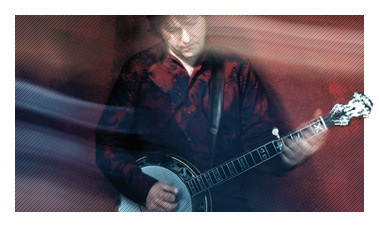 |
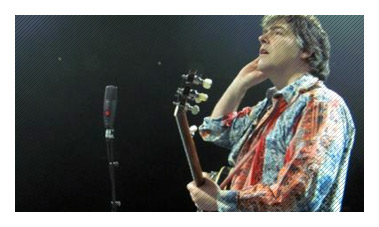 |
stated: You played in a couple of different bands in the early days, including Wickers Creek and Tasty Licks. Can you tell us a bit about those early years getting started?
BÉLA FLECK: Wickers Creek was my first traveling group, during my senior year of high school. The guys were based in Dobbs Ferry [NY]. I would take the train to the last stop in the Bronx and they’d drive down to pick me up, then we’d go play places in Westchester and Connecticut. I had a deal with my mom that I could play these gigs on weeknights as long as I made it home that night and to school the next day. So I’d be riding the subway back at 3 or 4 in the morning and getting up at 7am, then toughing it out through the school day… It was brutal!
stated: That’s dedication, especially at that age. It sounds like your family was pretty supportive. Did they worry at all about your career choice?
BÉLA FLECK: They were pretty distracted at the time as my mom was pregnant with my little brother during my senior year of high school. This is how I managed to get through High School without applying to colleges. By the time it was discovered, it was far too late to fix. My mom would still ask if I would ever want to go, through the first 10 years of my career… Finally she realized I was doing OK.
After graduating High School, I got a job playing with Tasty Licks in Boston. This was a serious touring group, and we got around—hit the southern festivals, Canada, and lots of New England. When that group split up, I played on the streets for a summer in Cambridge, before moving to Kentucky.
stated: How did you go from playing the streets of Boston to getting involved with the powerhouse that was New Grass Revival?
BÉLA FLECK: When still in Boston, I got the chance to make my first album, Crossing The Tracks, on Rounder Records. I hired Sam Bush to play on it, and it led to him asking me to join the group in 1981. This was truly entering the big time. New Grass Revival changed my life! These are some of the best musicians in the world and we toured constantly for nine years. Lovely times.
stated: You’ve continued to play with some of them over the years. Do you think New Grass Revival will reunite in the future?
BÉLA FLECK: All I can say is that if all of us wanted to reunite, we would. Not everyone does, so it doesn’t look likely. I would do it, if it were up to me.
stated: Béla Fleck & The Flecktones first convened in 1988 to play on the PBS special, Lonesome Pine. How did that original lineup find one another?
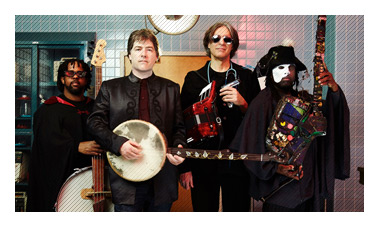 |
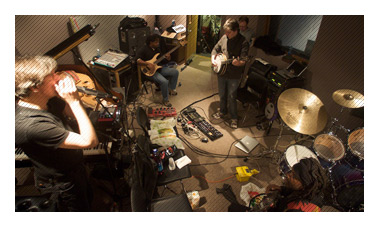 |
[ Subscribe to the Stated Magazine Newsletter and follow us on Facebook and Twitter! ]
BÉLA FLECK: I met Howard [Levy] while on tour with New Grass in Canada at the Winnipeg Folk Festival. A mutual friend directed Howard and I to each other, and sparks flew. I kept him in mind. I got a phone call one day from a guy I knew who had a friend with him who played the bass. He put this guy on the phone to play for me. It was Victor Wooten. He blew me away. I invited these two guys to do a PBS TV show that I had been offered. I just needed to find a drummer. Victor told me about his very unusual brother [Roy Wooten], who came to be known as Futureman. This show was a success, and the band stuck!
stated: We’re certainly glad of that. The Flecktones’ sound emanates pure joy that can’t be contained or categorized. Did you consciously set out to change expectations of the banjo or was that a side effect or your eclectic tastes?
BÉLA FLECK: I think it was both! I wanted to impress myself with taking the banjo seriously and getting into some unknown areas, but also I was fascinated by all these different types of music, and excited by the idea of playing them. I am very happy that our ‘crazy dream’ music can lead to joy for so many people besides ourselves.
stated: “Crazy dream music” is a great way to describe it. Does that description have any significance?
BÉLA FLECK: There is a song by Paul Brady called “Crazy Dreams” that I have always loved. Following those dreams is the underlying structure of our band—every one of us is living an unlikely but very satisfying musical life.
| The Making of Rocket Science | Béla with Steve Martin and his early teacher, Tony Trischka, on Late Night with David Letterman |
stated: The Flecktones have played with an eclectic array of musicians (our recent featured stated musician, Jon Anderson of Yes, was featured on the Outbound album). Original member Howard Levy left in 1992, then Jeff Coffin came on board for several albums before recently joining the Dave Matthews Band full time (with whom you’ve also had a long association). Now Howard is back for Rocket Science and you’ve gone full circle. What was it about the timing that brought him back?
BÉLA FLECK: The timing was very natural. The band was at low ebb, and we were taking three years pretty much off, when LeRoi Moore died (sax player from Dave Mathews Band). Jeff started subbing with them, and when they offered him the job, we all thought he should do it—it was such a great opportunity for him, and we had no clear plans for when we would tour together again. A year or so later we wanted to tour. It opened up the creative question, “what now?” I look at negatives as opportunities for positives as much as possible, and this seemed like a big chance to turn left with the band. As Jeff was reinvigorating DMB, the right new person might do the same for us. When we discussed it, the name that came up was Howard. What could we do with him 18 years later was a very interesting question.
stated: It’s certainly paid off. The reunited lineup is playing with new energy and purpose and Howard’s piano and harmonica add such warmth and personality. How has it been playing together again?
BÉLA FLECK: It feels great—old and familiar, while being brand new. And Howard is truly an incendiary player. He brings cool stuff out of all of us.
stated: There are no vocals on Rocket Science. Is that something you think the group will explore again in the future?
BÉLA FLECK: I am not in a hurry for vocals, it was just something we tried. If I were inspired to write songs again, I might try it. Honestly, the vocal part of our recordings were not well received, so I’d have to feel very into vocals to want to try again.
stated: Do you have a favorite track on Rocket Science—maybe something about a particular song that’s stayed with you?
BÉLA FLECK: I like the whole album. I could tell you what I like about each song, but it would take a while. How about “Falani”? Inspired by an African song, it has a very sweet sound, and I am happy about the feel and mood that we got into.
stated: It’s a gorgeous tune, and nice to hear the African influence. The Throw Down Your Heart album and film document your trip to Africa to return the banjo to its roots. What inspired the project and how did that experience change you and your music?
BÉLA FLECK: New experiences can certainly change your perspective, and my African experience made my world larger. Both musical and personally it was a fantastic experience. Now I have those musical concepts and rhythms to draw on in my writing and improvising, and some wonderful new friends. And feeling the connection to the history of the banjo is a great thing as well.
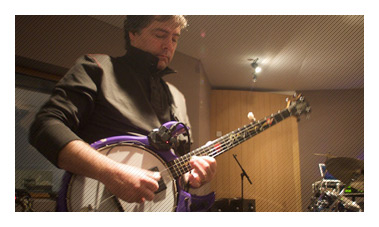 |
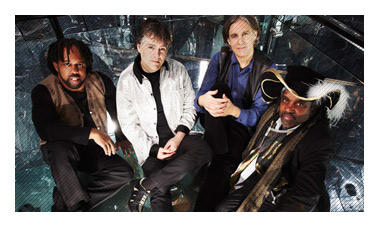 |
| Béla plays the Grammy-winning Thrown Down Your Heart | The Flecktones (with Jeff Coffin on saxophone) play “Big Country” |
stated: What initially inspired you to go to Africa and take on that project?
BÉLA FLECK: I have wanted to go to Africa ever since I found out that the banjo came from there. And I heard tantalizing snippets of amazing music from Africa though the years. When I heard Oumou Sangaré for the first time, I realized that I could fit into her music. That really made me want to go. Then The Flecktones decided to take a year off, and I realized that it was time.
stated: The results were extraordinary. On another note, congratulations are in order on your recent marriage to fellow banjo player, Abigail Washburn! Do you mind telling us how you met? Do you plan any further recording together?
BÉLA FLECK: I am very fortunate to have met Abby. We have such a great time together, and it has been a major life change for the better, as well. We met here in Nashville; she is part of the acoustic scene I live in. We plan to do a duo album one of these days. The Sparrow Quartet is our main collaboration so far.
stated: The Sparrow Quartet’s music is pretty fascinating in its own right, mixing bluegrass and Asian influences, and yet it still feels accessible, thanks in large part to Abigail’s warm vocals. What was the impetus and will we hear more from Sparrow?
BÉLA FLECK: Abby recruited us for a trip to China, which she takes at least once a year. She thought we’d all have fun together, but how we would make it work was hard to imagine, with two banjos, fiddle and cello. Abby is very open that way, she knew everyone was good and that it would work out somehow, and it did. When we got home, we all felt excited about making an album and touring for a year. I don’t know whether we will do more as Sparrow, but it sure was fun. Abby and I will certainly do some duo stuff down the line.
stated: We’ll look forward to it. What are you listening to these days?
BÉLA FLECK: I am listening to a lot of classical music, Bartok [after whom Béla is named] has opened my mind, Brahms has soothed me, and Wagner irritated me! (Just kidding). I have been studying these classic composers for inspiration for my first banjo concerto, which I have pretty much completed now. It will be premiered by the Nashville Symphony, who commissioned it.
stated: Excellent! More to look forward to. What would you name as your top three “desert island discs”?
BÉLA FLECK: Desert Island? Joni Mitchell - Blue, Tony Rice - Manzanita, Pat Metheny - Offramp. (Today’s spur of the moment choices only).
stated: Great choices. What do you think it is that keeps you coming back to music?
BÉLA FLECK: I don’t ever leave it! But one goal is to avoid becoming jaded or bored by always challenging myself. Then there is an excitement and something to get out of bed for!
stated: Thanks so much for joining us.
BÉLA FLECK: All the best.
| Thrown Down Your Heart trailer | The Flecktones play their Grammy-winning, “The Sinister Minister” |
—-
Visit Béla at:
www.belafleck.com
www.flecktones.com
Rocket Science on iTunes
[ Subscribe to the Stated Magazine Newsletter and follow us on Facebook and Twitter! ]
 Ryan Swearingen in
Ryan Swearingen in  featured interviews,
featured interviews,  interviews tagged
interviews tagged  Bela Fleck,
Bela Fleck,  Flecktones,
Flecktones,  bluegrass,
bluegrass,  film,
film,  jazz,
jazz,  music,
music,  performance
performance 









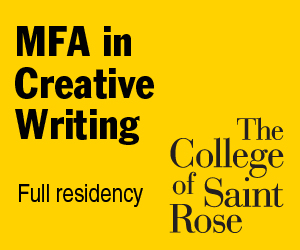
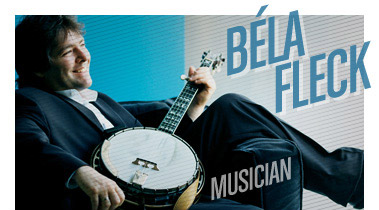

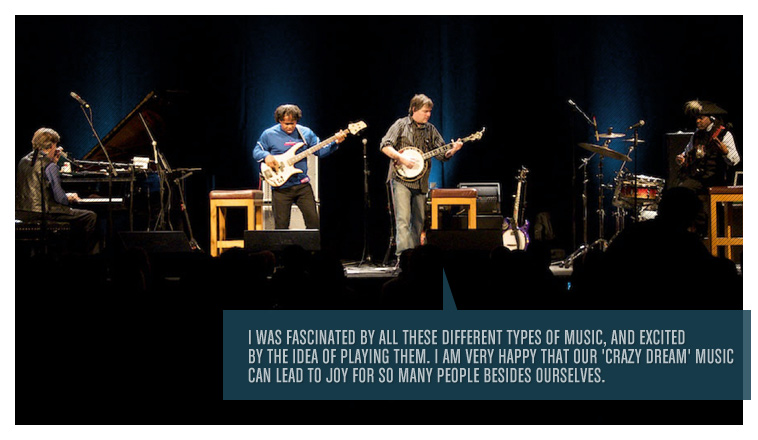
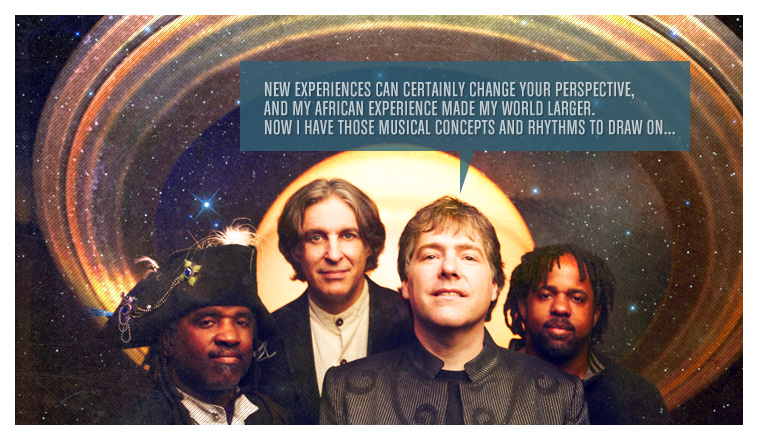
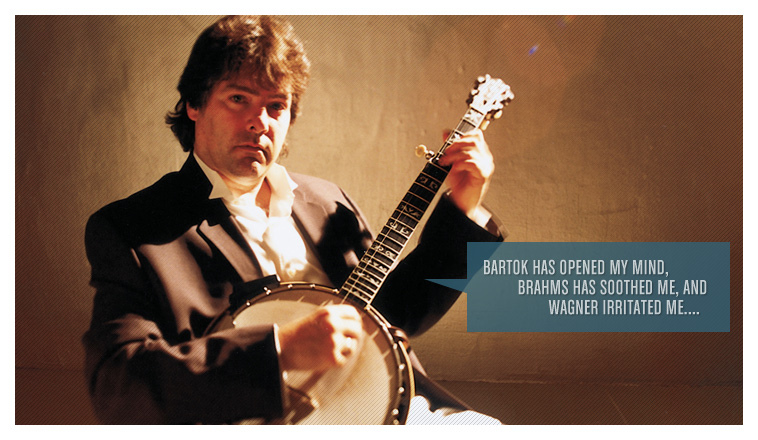

Reader Comments